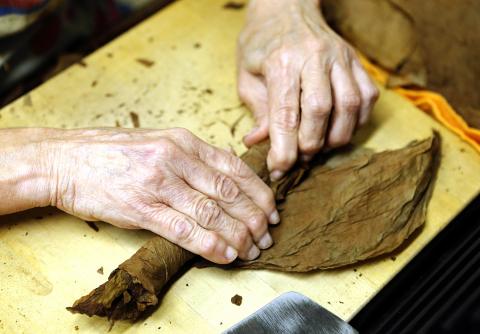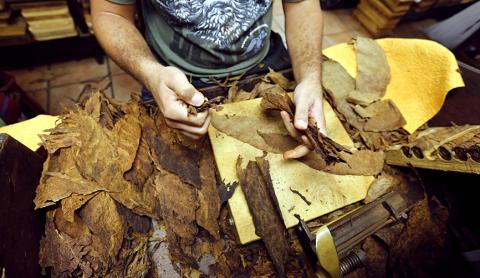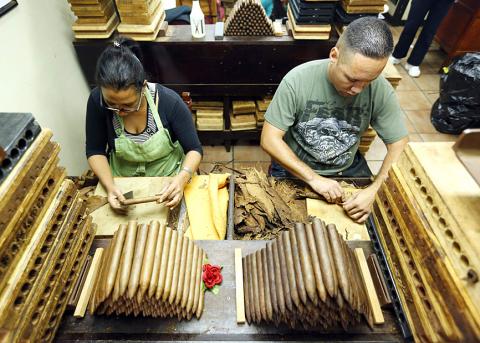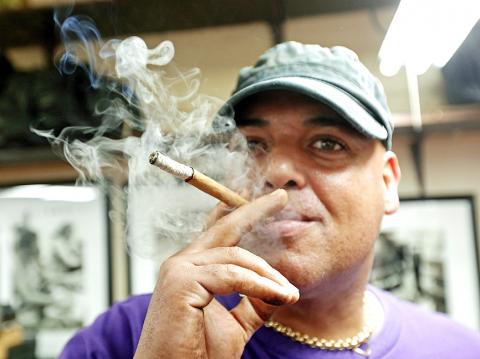Inside a Little Havana cigar rolling business in the heart of Cuban Miami, Maria Sierra’s gnarled fingers perform the same dance they did for more than three decades for Havana’s famed El Laguito cigar factory.
She cuts a teardrop from a broad tobacco leaf, then glues, wraps and twists it onto the end of a near-finished cigar, forming the small fan that is the signature of high-end Cuban cigar rollers.
More than five decades after a trade embargo banned imports of cigars from Communist-ruled Cuba, the majority of US cigar imports come from other Caribbean countries, as well as Central America.

Photo: Reuters
Yet in Miami, a niche industry is growing, centered on a few dozen elite Cuban rollers who make special-edition cigars that sell for as much as US$700 per box in Europe.
Cigar Aficionado, the industry’s leading glossy magazine, recently highlighted Miami’s cigar industry describing the city as a “a new hot spot for creative cigarmakers.”
When she was 18, Sierra was one of 30 Cuban women selected from thousands to learn the craft from former Cuban president Fidel Castro’s personal cigar roller, Eduardo Rivera.

Photo: Reuters
Women entered the male-dominated factories at the urging of Cuban revolutionary Celia Sanchez, a close confidant of Castro’s in the 1960s and 1970s.
“We would start with one little cigar and they would watch over us very closely, removing those who didn’t do well enough,” said Sierra, now 64. “A group of 30 or 40 women would come in to learn and after a couple of days only one or two were left.”
Sierra is one of 10 rollers working at El Titan de Bronze (The Bronze Titan), a Little Havana store named after Antonio Maceo, a general in the Cuban War of Independence against Spain.

Photo: Reuters
Other rollers came from Cuba’s respected Partagas and H. Uppman factories. Some were arrested several times trying to escape before they made it to Miami.
“We’re basically a boutique,” El Titan de Bronze owner Sandy Cobas, whose father Carlos opened the small shop about 20 years ago. “We don’t produce in mass quantities and the cigars are done exactly like they are in Cuba.”
In Miami, Cuban rollers are prized for their rigorous training. Unlike rollers in other cigar-producing countries, each is responsible for his or her cigar, from start to finish.

Warning: Smoking can damage your health
Photo: Reuters
“A lot of the families of plantation owners left for those countries with [Cuban tobacco] seeds in a handkerchief,” Cobas said. “None of those countries were known for making cigars.”
Tropical Tobacco, which produces Casa Fernandez cigars, opened a small factory in Miami last year, hiring a dozen or so Cuban rollers who produce about 1,200 cigars a day.
At the company’s factory in Esteli, Nicaragua, Fernandez employs 50 to 60 rollers who work in pairs — with one bunching tobacco and wrapping the cigars, and another applying the cap — to make 15,000 cigars daily.
Last year, the bulk of the US’ cigars came from the Dominican Republic, Nicaragua and Honduras, with imports from those countries totaling almost US$600 million, according to the US Department of Agriculture.
“The Cuban rollers that are available in the Miami market are the best in the world,” Tropical owner Eduardo Fernandez said. “We saw a niche where we can respond quickly to the market and make high-end cigars on premises.”
In Miami’s specialty cigar factories, bunches of cured tobacco sit in black garbage bags in walk-in humidors to keep them pliable. They are marked with the country of origin, such as Brazil or the Dominican Republic, and whether they are to be used as the cigar’s filler or final wrapper.
George Rico’s G.R. Tabacaleras Corp, a distributor in Miami, opened a small suburban factory last year offering enthusiasts the chance to learn everything about the cigar-making process.
The company does the bulk of its manufacturing in Danli, about 80km south of Honduras’ capital, Tegucigalpa. In Miami, it offers the deluxe “G.A.R. Deli” experience for customers who can afford to spend US$250 on a box of 25 cigars.
In a two-hour session with Rico, smokers learn that soil and seasons can affect the flavor of tobacco and also how cigars are made. They sample dozens of tobaccos and finish by creating their own blend, which is handed off to a Cuban roller.
Despite the Cuban rollers’ lofty reputation, Rico said there are more of them than there is work available. At the same time, not all rollers are as passionate as El Titan’s Sierra, who retired from cigar making in Cuba in 2011, but returned to it after moving to Miami to be close to her daughter.
“You can make a decent living, but some rollers ... want to move on to other jobs,” Rico said.

MULTIFACETED: A task force has analyzed possible scenarios and created responses to assist domestic industries in dealing with US tariffs, the economics minister said The Executive Yuan is tomorrow to announce countermeasures to US President Donald Trump’s planned reciprocal tariffs, although the details of the plan would not be made public until Monday next week, Minister of Economic Affairs J.W. Kuo (郭智輝) said yesterday. The Cabinet established an economic and trade task force in November last year to deal with US trade and tariff related issues, Kuo told reporters outside the legislature in Taipei. The task force has been analyzing and evaluating all kinds of scenarios to identify suitable responses and determine how best to assist domestic industries in managing the effects of Trump’s tariffs, he

TIGHT-LIPPED: UMC said it had no merger plans at the moment, after Nikkei Asia reported that the firm and GlobalFoundries were considering restarting merger talks United Microelectronics Corp (UMC, 聯電), the world’s No. 4 contract chipmaker, yesterday launched a new US$5 billion 12-inch chip factory in Singapore as part of its latest effort to diversify its manufacturing footprint amid growing geopolitical risks. The new factory, adjacent to UMC’s existing Singapore fab in the Pasir Res Wafer Fab Park, is scheduled to enter volume production next year, utilizing mature 22-nanometer and 28-nanometer process technologies, UMC said in a statement. The company plans to invest US$5 billion during the first phase of the new fab, which would have an installed capacity of 30,000 12-inch wafers per month, it said. The

Taiwan’s official purchasing managers’ index (PMI) last month rose 0.2 percentage points to 54.2, in a second consecutive month of expansion, thanks to front-loading demand intended to avoid potential US tariff hikes, the Chung-Hua Institution for Economic Research (CIER, 中華經濟研究院) said yesterday. While short-term demand appeared robust, uncertainties rose due to US President Donald Trump’s unpredictable trade policy, CIER president Lien Hsien-ming (連賢明) told a news conference in Taipei. Taiwan’s economy this year would be characterized by high-level fluctuations and the volatility would be wilder than most expect, Lien said Demand for electronics, particularly semiconductors, continues to benefit from US technology giants’ effort

‘SWASTICAR’: Tesla CEO Elon Musk’s close association with Donald Trump has prompted opponents to brand him a ‘Nazi’ and resulted in a dramatic drop in sales Demonstrators descended on Tesla Inc dealerships across the US, and in Europe and Canada on Saturday to protest company chief Elon Musk, who has amassed extraordinary power as a top adviser to US President Donald Trump. Waving signs with messages such as “Musk is stealing our money” and “Reclaim our country,” the protests largely took place peacefully following fiery episodes of vandalism on Tesla vehicles, dealerships and other facilities in recent weeks that US officials have denounced as terrorism. Hundreds rallied on Saturday outside the Tesla dealership in Manhattan. Some blasted Musk, the world’s richest man, while others demanded the shuttering of his